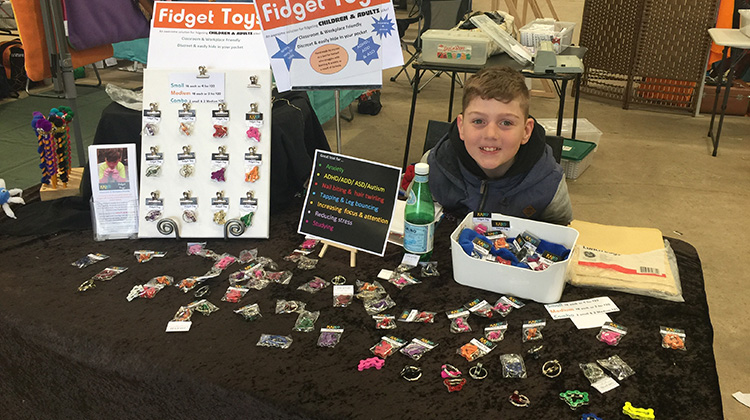Toys for the Neurospicy have a Calming Effect

Kai Seymon, from Melbourne, is a little neurospicy, his condition meant he liked to have something tactile in his hands to distract and calm himself when he felt overwhelmed or stressed.
So, Kai and his fidget spinner were seldom apart, but kids, being like what they are, picked on him because fidget spinners are for babies apparently.
Kai tasked himself with inventing toys, helped by Mum Jo who is an occupational therapist and also a bit neurospicy, that would meet his various sensory needs and created something extraordinary; a range of tactile toys designed for the neurodiverse by the neurodiverse. It has taken off with Kai’s products under the Kaiko brand finding fans here and increasingly overseas.
They have created toys like Wrist Spikey bracelets specifically designed to replace non suicidal self-harm, providing ‘safe’ ouch options that are portable and discreet or pen click replacement and skin picking supports, or a tool that has hair-like structures within a silicone exterior allowing users to pick and pull the fragments out.
“Jade, a customer, vulnerably shared she was turning to cutting to regulate. We collaborated with her on design to go on to create the wrist spikey, a safe ouch tool to replace cutting,” says Kai.
“The psychological premise behind Kaiko Fidgets is that the products can stop a repetitive circuit in the brain, those that are anxiety-prone, are neurodivergent, like myself as an autistic.”
The range is being used extensively in primary, secondary and tertiary educational settings, as well as organisations such as Headspace, hospitals and clinical settings.
“What we would love teachers to know is that there ARE super quiet, purpose built tools to assist with learning and focus, as well as support students regulation, harm reduction and manage anxiety. That these tools are a broad variety and that we cover a very wide range of needs. We have thousands of schools already using them around Australia with impressive outcomes. Finally, that we are more than happy to field questions re needs and assisting in matching needs to range, ours or otherwise as we are passionate about supporting learners in any setting.
“In Australia, 1 in 5 have a learning difficulty or are neurodivergent and 1 in 4 identify as having metal health issues. FIDGETS aren’t just about keeping hands busy. They are, for many, a lifeline that enables them to COPE with day-to-day stressors. Also helps them soar to heights by allowing them to focus, regulate and think. Having tools that are discreet, robust and cover a diverse range of needs is key and the "why" behind what I do,” he says.
One might describe the product development process at Kaiko as dynamic.
“Our innovation process at Kaiko Fidgets is simple, we start with a NEED. Someone will share a problem, and we go into overdrive coming up with options and solutions. Which is why we are constantly creating sensory tools that are ‘Outside the Box’. We’re sometimes chaotic in our approach, not bogged down by ‘boring’ number crunching process lol.
“We aim to provide sensory supports that assist in everyday moments of overwhelm, stress and dysregulation. We are super proud to be constantly evolving our range and closely collaborating with our Kaiko ‘community’ of customers to ensure we meet as many sensory needs as possible. We ‘lean into’ needs that, for many, are hidden needs such and safe alternatives for self-harm, including picking, hair twirling and cutting. This includes a number of co-created designs that we have launched in collaboration with our customers."
Mum Jo adds, “Our youngest innovation STAR is Isla, a primary school Kaiko customer. She wrote to Kai & myself asking for us to make a bookmark to clip fidgets to. We worked with Isla in each of its design and protocol phases. Isla got to see her product concept come to life… Pretty cool huh! These are the best moments to be honest.”
Kai is currently one of 19 semi-finalists from around the world, chosen from over 1000 students globally, as part of the EO global student entrepreneur competition with further developments to come in June 2025. It might be neurodiversity can be harnessed and turned into an advantage.